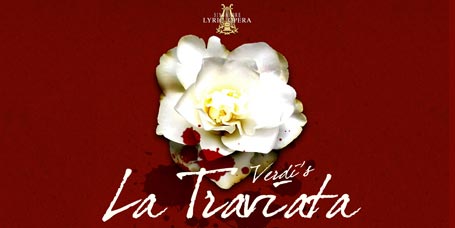Listening to Stephen Barlow talk is hypnotic. Called on to interview an internationally acclaimed opera director, I'd hardly expected to be faced with this upbeat, surprisingly young and compelling Australian man, recently hired as director of Singapore Lyric Opera's production of La Traviata.

"It's a great story, not just because it's a story we can believe in, but because it's a story we want to believe in. We want to believe that in our lives, we will experience the joy of a pure and true love. We want to believe it is possible that whatever hurt and offence we may have caused in our lives, it is possible to right those wrongs by sacrifice to the greatest good. And that is the great theme of Traviata - self-sacrifice." Director Stephen Barlow on La Traviata.
Patiently, he walks me through the history of this celebrated opera about a young man who falls in love with a dying coutesan. It began as a novel, La Dame aux Camélias (The Lady of the Camellias) by Alexandre Dumas Jr, who based it on his true-life experience of falling in love with a famous Parisian prostitute and then watching her friends abandon her as she died of tuberculosis. Within five years, it was adapted for the musical stage by Giuseppe Verdi - who was, Stephen says, "without question, the greatest composer of opera". Reborn in 1853 as La Traviata, meaning "the fallen woman," the work is full of rich, rousing music, including Gypsy dances and the famous Brindisi drinking chorus. Yet it's also fantastically intimate and poignant, centred on the very fragile, domestic love story played out between the courtesan Violetta, her lover Alfredo and his disapproving father Germont.
Since then, La Traviata's had numerous interpretations on the stage and screen. Stephen recalls with pleasure the 1921 silent film Camille which starred Rudolph Valentino, the 1936 film of the same name that featured Greta Garbo's most memorable performance, and of course 1990's Pretty Woman, based on the opera but with a happy ending tacked on, and most recently, 2001's Moulin Rouge.
For Stephen as well, it's been a long road to get to this point. Growing up, he remembers listening to his parents' vinyl records of old Broadway musicals, and getting hooked on music. While still in school, he worked as a theatre usher, sitting in for free on the touring performances of the Australian Opera. He had a very positive coming out experience at the age of 19, while studying music history at Melbourne University.
"I was surrounded by friends and family, none of whom were gay, but all of whom were very supportive, because they loved me and as long as I was happy and fulfilled, they were as well," he remembers.
After graduating, Stephen moved to London, where his work on a Gilbert and Sullivan operetta got him an invitation to join the directing staff of the Glyndenbourne Opera Festival. "And that's taken me to Covent Garden, and the Kirov Opera in St Petersburg, and it's taken me to Singapore," he chuckles.
While in London, he also met his partner of 14 years: the theatre director Julian Woolford, with whom he shares a flat. When I ask if they have any adopted children or dogs, he laments the apartment rules.
"We're desperate to have a cat - we've already decided to call it "Cosmo," after the cosmopolitan cocktails that I'm famous for making and drinking among my circle in London."
Amazingly, La Traviata will mark his directing debut in Asia, and SLO's assembled a fine cast drawn from all over Asia for him to work with. "I work in Europe and America, where very few Asian opera singers have broken through - which is very strange, because in all the international opera competitions, Asian singers figure very prominently," he says. Violetta will be played by the Hong Kong/Singapore soprano Nancy Yuen, while Alfredo and Germont will be respectively played by Lee Jae Wook and Song Kee Chang from South Korea - a country which, according to Stephen, produces an absurdly disproportionate number of award-winning opera singers. Other singers hail from Thailand, the Philippines, China, Indonesia and Malaysia - not at all unusual in the international world of opera.
Conscious that Singapore audiences have few chances to watch opera, Stephen's decided to follow a fairly traditional staging for the show.
"If we're introducing people to a new work, or a work that they haven't seen for a long time (La Traviata was last seen in Singapore ten years ago), we shouldn't play too fast and loose with it - unlike in Germany, where La Traviata might be set in a bowl of custard, or on the moon, or on roller skates," he says. Still, he's decided to shift the setting of the story from the 1850s to the year 1889, the date of the Grand Exposition in Paris and the opening of the Eiffel Tower; the height of what's now known as the Belle Epoque or beautiful age of the city.
But the Belle Epoque also had its ugly side. "It was in the 1880's that the city acquired a less than savoury reputation as the sin capital of Europe," he says.
"Lots of cabarets, supper clubs and bars opened up, places like the Moulin Rouge, which are still open today - it was when the religious morals became much looser. And that brings out the themes of decadence, morality and redemption that are in La Traviata." The city ultimately operates as a metaphor for Violetta's illness, something that stalks her and that she tries in vain to escape. "Although we think of Paris as traditionally a city of love and romance, it's also a city of destruction and disease."
"It's a great story," he reflects, musing on the opera. "Not just because it's a story we can believe in, but because it's a story we want to believe in. We want to believe that in our lives, we will experience the joy of a pure and true love. We want to believe it is possible that whatever hurt and offence we may have caused in our lives, it is possible to right those wrongs by sacrifice to the greatest good. And that is the great theme of Traviata - self-sacrifice."
La Traviata: The story of love and betrayal
By Giuseppe Verdi
Conductor: Eric Zhu Qiyuan, China
Director: Stephen Barlow, Australia
CAST
Violetta Valery: Nancy Yuen, Hong Kong/Singapore
Alfredo Germont: Lee Jae Wook, South Korea
Germont Giorgio: Song Kee Chang, South Korea
Gastone: Lemuel dela Cruz, Philippines
Barone Douphol: Saran Suebsantiwongse, Thailand
Marchese D'Obigny: Ronald Villaruel, Philippines
Dottore Grenvil : Lawrence Jatanya, Philippines
Flora Bervoix: Clarissa Ocamp, Philippines
Annina: Denise Tan, Singapore/Malaysia
La Traviata will be performed at the Esplanade Theatre at 8pm from Jan 25 to 29, 2008. Tickets are available at $150 (box seat), $130, $110, $88, $68, $38 and $25 from Sistic.com. More details at http://www.singaporeopera.com.sg.

